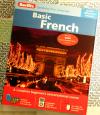Berlitz Basic French Course Book and 3 Audio CDs
Berlitz Basic French136 page fully illustrated course book and 3 Audio CDs |
 |
Berlitz Basic French - Course Book and 3 Audio CDsBrand New : 3 CDs* Audio CDs that play on Car/Home/Portable CD Player * Compatble with iPOD and mp3 devices * Go online for free additional materials Learning French is now made even simpler with Berlitz Basic French, the affordable self-study audio course using the Berlitz conversational approach lauded by millions. For years, the way to learn a language was through repetition and grammar drills - but current research shows that people learn best and retain more when engaged in meaningful, real-life conversations. Berlitz Basic French offers six audio CDs filled with short, easy-to-follow lessons on popular topics like introducing yourself, eating out, and traveling. The practical, everyday language is narrated by native speakers and immediately applicable to day-to-day life. Plus, the accompanying full-color course book is packed with word banks, review exercises, pronunciation tips and more to help anyone read, write, listen and speak with confidence. History of FrenchFor any of the period to as much as around 1300, some linguists make reference to the oïl languages collectively as Old French (ancien français). The earliest extant text in French could possibly be the Oaths of Strasbourg from 842; Old French came to be a literary language by using an chansons de geste that told tales while using the paladins of Charlemagne properly as the heroes you get with the Crusades. By way of the Ordinance of Villers-Cotterêts in 1539 King Francis I made French the official language of administration and court proceedings in France, ousting the Latin which in fact had been used before then. Likely the most imposition of a standardised chancery dialect and in addition the loss in regards to the declension system, the dialect is called Middle French (moyen français). The first grammatical description of French, the Tretté de la Grammaire française by Louis Maigret, was published in 1550. Some 700 words of modern French that are derived from Italian were introduced this kind of period, including several denoting artistic concepts (scenario, piano), luxury items, and food. Following a period of unification, regulation and purification, the French coming from the 17th on to the 18th centuries is sometimes termed as Classical French (français classique), although many linguists simply refer to French language from the 17th century to today as Modern French (français moderne). The basement walls with regards to Académie française (French Academy) in 1634 by Cardinal Richelieu created an official body whose goal could have been the purification and preservation in regards to the French language. This group of 40 members is named the Immortals, not, as some erroneously believe, as they are chosen to serve for any of the extent of their lives (which they are), but also becasue all around the inscription engraved on the official seal made available to them by their founder Richelieu-"À l'immortalité" ("pertaining to the Immortality (in regards to French language)"). The building blocks still exists and plays a part in the policing all around the language in addition to the adaptation of foreign words and expressions. Some recent modifications include the change from software to logiciel, packet-boat to paquebot, and riding-coat to redingote. The definition of ordinateur for computer was however not created by the Académie, but because of a linguist appointed by IBM (see fr:ordinateur). Out of your 17th pertaining to the 19th centuries, France was the class leading power of Europe; as a result of this, With the influence associated with the Enlightenment, French was the lingua franca of educated Europe, especially regarding the arts, literature, and diplomacy; monarchs like Frederick The Great of Prussia and Catherine II of Russia could both speak and write in French. During the 17th and 18th centuries, the French language established itself permanently inside of the Americas. There is always an academic debate about precisely how fluent in French were the colonists of New France. While a minority of colonists (mostly women) were coming from the region of Paris (approximately 20% of all the colonists), most all of them came from northern and western regions of France where French was not the primary language natively spoken by its inhabitants. This isn't clearly known, however, just how many among those colonists understood French if you are a second language, and exactly how many included in this - who, in overwhelming majority, natively spoke an oïl language - could understand, and be understood by, people today who speak French thanks to interlinguistic similarity. Nonetheless, a linguistic unification from the groups coming from France happened (in a choice of France, found on the ships, or in "Canada") such that, as documented in many sources, the then "Canadiens" were all speaking French natively due to the fact end with regards to 17th century, some time before the unification was complete in France. Today, French is the usual language of about tens of millions of people (not counting French-based creoles) while in the Americas. Through to the Académie, public education, centuries of official control and in addition the role of media, a unified official French language may have been forged, but there remains a great deal of diversity today in the case of regional accents and words. For a few critics, the "best" pronunciation you get with the French language may be known with regard to The only real used in Touraine (around Tours properly as the Loire River valley), but such value judgments are fraught with problems, along with the ever increasing loss of lifelong attachments which has a specific region and in addition the growing importance of all the national media, the long run of specific "regional" accents can often be difficult to predict. The French nation-state, which appeared as soon as 1789 French Revolution and Napoleon's empire, unified the French people in particular during the entire consolidation with regards to utilisation of the French language. Hence, as indicated by historian Eric Hobsbawm, "the French language may perhaps be essential in the direction of concept of 'France', although in 1789 50% of a typical French people didn't speak it in any way, and only 12 to 13% spoke it 'fairly' - the fact is that, even in oïl language zones, as a result of a central region, it was not usually spoken except in cities, and, even there, not always active in the faubourgs. North like for example the South of France, almost nobody spoke French." Hobsbawm highlighted the role of conscription, invented by Napoleon, in addition to the 1880s public instruction laws, which allowed to mix the variety of groups of France proper into a nationalist mold which came up with French citizen with the exceptional consciousness of membership up to a common nation, while a variety of "patois" were progressively eradicated.
|
Berlitz Basic French - Course Book and 3 Audio CDs |
| Retail: | $59.95 |
| On Sale: | $49.95 |
| You Save: | 17% |
| Stock Info: | Out Of Stock |
| Receive In Stock Notification |

 0 Items (Empty)
0 Items (Empty)






